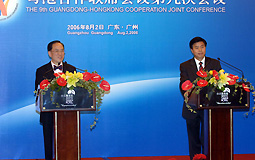 |
| Major breakthrough: Chief Executive Donald Tsang and Guangdong Governor Huang Huahua meet the press after the 9th Plenary of the Hong Kong-Guangdong Co-operation Joint Conference. |

|
A major breakthrough has been made in the discussion on the Hong Kong-Zhuhai-Macau Bridge construction, Chief Executive Donald Tsang says. All parties have agreed to have separate locations for boundary crossing facilities.
The China Highway Planning & Design Institute will be commissioned to study options for the boundary facilities.
After the 9th Plenary of the Hong Kong-Guangdong Co-operation Joint Conference with Guangdong Governor Huang Huahua today, Mr Tsang said the study on financing the bridge will continue. Once plans have been confirmed and the Central Government has given approval, construction will start immediately.
Mr Tsang said both sides are working on commissioning the Hong Kong-Shenzhen Western Corridor by next July. They will also strive to complete the evaluation and planning study of the Eastern Corridor as soon as possible.
Air pollution
Meanwhile, both sides reconfirmed their goal to achieve the agreed emission reduction targets by 2010 to improve regional air quality.
The Special Panel on Pearl River Delta Air Quality Management & Monitoring, under the joint conference, has completed an implementation framework for the Emission Trading Pilot Scheme for Thermal Power Plants. The implementation framework will be presented to participating power plants this year, so they can identify trading partners and draw up emissions trading agreements.
Both sides will announce in October the first half-yearly report on the monitoring results of the PRD Regional Air Quality Monitoring Network. They will also start a mid-term review of the PRD Regional Air Quality Management Plan by year's-end.
The review will assess the effectiveness of various emission reduction measures and the emission trends in the region, formulate strategies and enhance control measures to achieve emission targets by 2010.
Other measures
The two governments will also implement their own measures.
Hong Kong will:
* introduce Euro IV vehicle emission standards for newly registered vehicles in phases this year;
* require power companies to reduce emissions and increase the use of natural gas; and,
* impose caps on the total emissions of power companies and complete the drafting of a new regulation for controlling volatile organic compound emissions.
Guangdong will:
* not plan to construct new coal or oil-fired power plants in the delta region;
* introduce liquefied natural gas for power generation;
* retrofit flue gas desulphurisation systems at power plants, and strive to complete major works for large-scale generation units by 2008;
* speed up the introduction of National III vehicle emission standards in Guangzhou and Shenzhen;
* ban leaded petrol; and,
* implement a pilot project in Shenzhen to install vapour recovery systems at oil depots and petrol-filling stations to further control emissions of volatile organic compounds.
Aviation co-operation
The co-operation project between the Hong Kong Airport Authority and Zhuhai Airport has been approved by the Central Government. The two sides will proceed with the handover of the management of Zhuhai Airport soon.
To tackle traffic at the inland control point in Wangcun, Dongguan, Guangdong will start operating the Liaobu inland control point by year's-end. The new facility will adopt express clearance systems to allow speedier and more effective inspection.
Hong Kong and Guangdong will issue an Autotoll-Unitoll Card. By the end of August, Hong Kong vehicles can enjoy the convenience of non-cash payment on tollways in Guangdong. They can also enjoy electronic non-stop payment if they are equipped with electronic tags.
The two sides will open the new control point between the Kowloon-Canton Railway Lok Ma Chau Spur Line and Futian in the first half of next year. They will also pursue new cross-boundary transport services, such as helicopter and direct cargo freight services.
Disease prevention
In view of the global threat of avian flu and new types of influenza, both sides agreed to make good use of the co-operation agreement in contingency measures during public health emergencies to strengthen surveillance, and alert and response systems.
Hong Kong and Guangdong will explore how to use information technology to trace the source of food, to enhance monitoring of food safety.
Mr Tsang also announced that he and Mr Huang will lead delegations of the two sides to Paris for a joint promotion on the Greater PRD and Pan-PRD regions on November 10.
Go To Top
|



